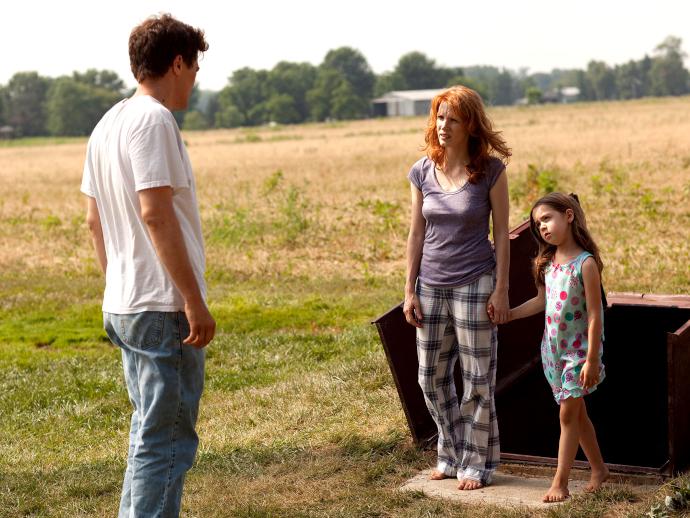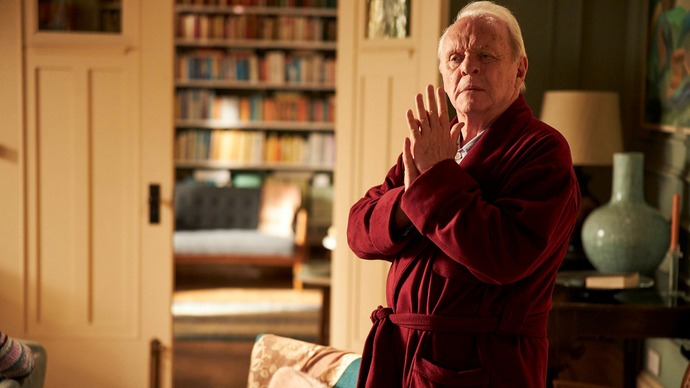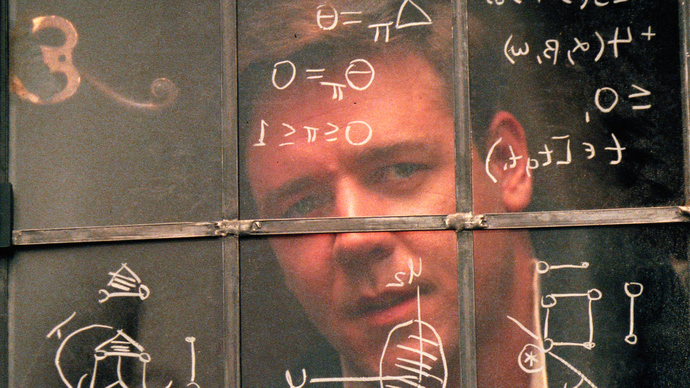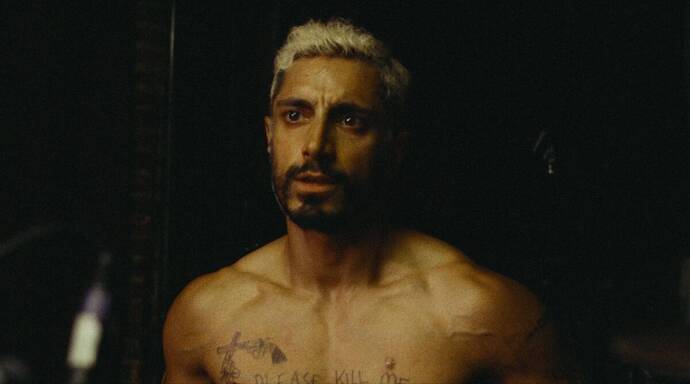From 1980’s The Elephant Man directed by David Lynch to 2014’s The Theory of Everything directed by James Marsh, cinema is packed with heartfelt melodramas starring disabled protagonists. What’s unique about a great film, though, is its ability to place us within the experience of its characters—much like our article about trippy movies that capture the feeling of being on drugs. The filmmaker’s full toolkit is exploited in such movies: sound design, cinematography, narrative structure, everything. We don’t just watch characters live with disabilities—we feel the weight of them. Here are some of the best movies about disabilities that give us a taste of what being physically or mentally debilitated is really like, and hopefully transform our sympathies toward them.
5. Take Shelter (2011)
The ambiguous cliffhanger at the end of Jeff Nichols’ Take Shelter perfectly embodies the confused mental state of its protagonist, Curtis. Played by Michael Shannon, Curtis continually observes signs of a storm brewing, but no one else believes him. Animals begin acting strangely, he’s plagued by nightmares, and Curtis even starts to obsessively build a storm shelter in preparation. Due to his mother’s mental illness, Curtis is immediately diagnosed with paranoid schizophrenia. Although he tries to accept this, Curtis can’t shake the feeling that he’s not sick—that his family really is in danger. Jeff Nichols takes a subtle approach to filming this psychological thriller, placing us completely in Curtis’ shoes. We see the signs and omens just as he does, unsure whether to believe him or the doctor’s diagnosis. In the final scene, Curtis goes on a family vacation, believing himself to be well again. But when black clouds gather again, we’re once again conflicted: is it real or in his mind? The final words of the movie are from his wife, who turns to Curtis and says: “Okay.” This can be read as an acknowledgment that his predictions were true all along, or final acceptance that Curtis will never be well enough to live a normal life. Like Curtis, we’ll never be sure.
4. The Father (2020)
The Father won two Academy Awards, including one for Best Actor in a Leading Role. Anthony Hopkins is dazzling as ever, starring as an elderly man suffering with dementia. There have been films on this topic before (like 2014’s Still Alice and 2017’s Majorie Prime) but The Father is unique in how it frames Hopkins’ perspective. It first seems like a drama, but is really a psychological thriller that captures the unnerving experience of forgetting who you are. Director Florian Zeller doesn’t just make us watch Anthony forget his life, but forces us to forget too. He wakes up in strange places—places that we, the viewers, have no knowledge of. His daughter, played by Olivia Coleman, suddenly appears as a different actress, now Olivia Williams. The three main settings in The Father—his apartment, his daughter’s apartment, and the hospital—all have the same architectural layout, but it’s hard to discern one room from the next, and the switches between past and present make for even more disorientation. Zeller manipulates the audience into the same fragile and confused state as Hopkins’ character. Through this clever use of filmmaking, Zeller intensifies the tragedy of it all, showing us how difficult everyday life is when none of the puzzle pieces fit together.
3. A Beautiful Mind (2001)
What makes A Beautiful Mind so powerful is the fact that… well, we won’t spoil it for you. What we do know is that John Nash is quirky—it’s certainly not the first time we’ve seen an awkward genius on screen. But we don’t realize the extent of John’s debilitations, nor does he. Russell Crowe plays the real-life American mathematician John Forbes Nash Jr., who made vast contributions to game theory. Director Ron Howard’s drama begins during his college days, where John struggles to navigate the adolescent world of girls and bars. His roommate/best friend and polar opposite Charles (portrayed by Paul Bettany) helps John make it through. Charles also has a niece, who comes to visit him at Princeton. Later, John is recruited by a mysterious man as part of the United States Department of Defense. But in between all of this, John is diagnosed with schizophrenia and he refuses to believe it. He tries to dig a microchip out of his arm with his bare hands, and ends up receiving brutal shock therapy. It’s a tragic story that fully depicts what schizophenia is like.
2. Sound of Metal (2019)
Sound of Metal, starring Riz Ahmed and Olivia Cooke, is a hard-hitting drama that cuts deep into the hearts of viewers. With fame and success on the horizon, heavy metal drummer Ruben Stone is faced with a sudden and devastating fact: he’s going deaf. Having lived his whole life in noise, music, and live gigs, a life of silence seems an empty and impossible task. Ruben tries to run from his creeping disability, which only makes matters worse. His history of addiction puts a strain on his relationship with fellow singer Lou, who worries he’ll fall back into old habits. Ruben continues to perform against doctor’s orders, and pays the price. What’s most remarkable about Sound of Metal is its sound design. Director Darius Marder plays with different audio effects to really expose the audience to a life that’s missing the sense of hearing. This isn’t just a case of making the film go silent from time to time. It’s a gradual decline into deafness, and that means parts that seem normal between parts that are muffled, loud, fragmented, jarring. It’s frustrating to hear fractured conversations that we can’t fully put together. One of the most poignant and tragic parts of the film is when Ruben is given an implant to supposedly “restore” his hearing. Though his sponsor advises against it, Ruben desperately clings to any chance of getting his music back—and we learn that deafness isn’t so easy to cure.
1. Notes on Blindness (2016)
Making a film about blindness—one where you experience the blindness alongside the character—is quite a challenge. Nobody wants to sit and watch two hours of a black screen. That said, directors Peter Middleton and James Spinney did an astounding job of portraying how it feels to be blind, and did so in creatively artistic and beautiful ways. Notes on Blindness is a docu-drama about writer John Hull, who falls blind in the lead up to his son’s birth. Played by Dan Renton Skinner, Notes on Blindness is a brilliant achievement in cinema. John didn’t fall blind overnight; his vision slowly deteriorated over decades. Middleton and Spinney signal this through a mixture of clear and hazy images, telling John’s story in fragments, almost like a dream. Now unable to write, John turns to his cassette tape and keeps an audio diary, which is heavily used in the film. As his vision lessens, John relies on his memories more and more—but as time passes, even these begin to fade away until he can scarcely picture his own wife. The woes of John’s story are evened out by lessons on hope and gratitude. Notes on Blindness merges old home movies with blurry landscapes, interviews, reenactments, and complete blackness to recreate John’s inner world—the only world he really has. It was an ambitious project, but one that certainly paid off, taking us through John’s affecting journey into accepting his disability. Read next: Incredible slice-of-life movies worth watching








